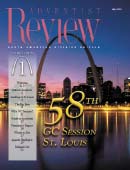 |
||
This question is sometimes asked seriously, and sometimes cynically. Intrinsically cynics really know the answer to their make-believe ignorance, and their lampooning is accepted in good humor. Some members, however, truly do not understand the need for auditors in the church. After all, aren't we all Christians? Aren't we all honest? The General Conference in session and in Annual Council meetings--the church at its highest administrative levels--has developed a policy that requires all denominational entities to be audited. The terms of reference for the audit of organizations above the local congregation have been codified in the General Conference Working Policy (see section SA 05, 2004-2005 edition). Does that mean that the General Conference thinks that church administrators are un-Christian, dishonest, and suspect? A careful reading of the Working Policy will reveal that an administrator's Christianity and honesty have nothing to do with the need for auditing. Denominational auditors (220 worldwide) are required to (1) express an opinion on the fairness with which financial statements represent the financial position and operating results of the entity being audited; (2) report on the entity's compliance with denominational policies; and (3) where applicable, report on the trust operations of the entity. The denomination requires all organizations (approximately 2,500 worldwide) to comply with an international body of accounting principles known as Generally Accepted Accounting Principles. Thus denominational auditors focus on whether financial statements comply with predetermined principles and are in compliance with denominational policies and trust agreements. This assures the church that every audit has been performed under the same rigorous standards. These standards have undergone significant revision during the past five years, which has placed additional responsibilities on both administrators and auditors. The explanation so far may lead to an even more searching inquiry: Why does the church require denominational financial statements from all over the world to be prepared using similar principles? Why do church auditors need to comply with international auditing standards? In fact, why does the church require its organizations to prepare financial statements that have to be audited? As a member of a local congregation, do you not look forward to the periodic church business meeting at which the church treasurer reports on the finances of the church? Are you not interested in knowing how church funds have been disbursed, how your congregation is doing financially, and how much money is available for the different projects on which the church has embarked? Take it one step higher: as a delegate to the conference or mission constituency meeting, do you not wait in interested anticipation for the treasurer's report on the financial standing of the conference or mission? It is impractical for every church or board member to peruse the financial records of the organizations they serve. That is what gave rise to the auditing profession! Auditors represent you and perform audits on your behalf. Further, many denominational entities and their accounting rules have become so complex that it requires a specialist to ensure that financial reporting is done correctly. Many church and board members do not have the inclination or time to devote to becoming such specialists. Auditors, with training and experience, are able to study those complexities and assist you through their reports. Financial reports are therefore a necessity to enable interested parties (including in some cases organizations outside of the church) to know how these organizations are faring. If those various financial statements were not prepared in accordance with specified generally accepted principles, how would you know that they are a fair presentation of the entity's affairs? Auditors! Who needs them? You as a church member, every denominational administrator, and the church at large need auditors! In addition to giving you assurance about the veracity of financial reports, audits serve to give those responsible for generating them credibility on their financial reporting stewardship. |
 |
 |


